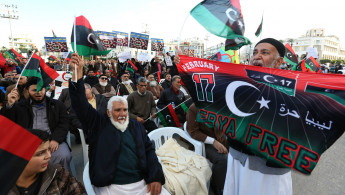United States weighing 'military options' in Libya
The growing IS presence in Libya is a "significant concern" and the United States is assessing how best to respond to the group's "metastasis" from Iraq and Syria, said Pentagon press secretary Peter Cook.
"We're looking at military options, a range of other options as... the situation in Libya unfolds," Cook said.
"We want to be prepared, as the Department of Defence always wants to be prepared, in the event that ISIL in Libya becomes more of a threat than it is even today," he added, using an acronym for the IS group.
In 2011, an uprising against longtime Libyan dictator Muammar Gaddafi quickly became an armed revolution backed by NATO, but his overthrow and killing have been followed by continued strife and political chaos.
Last June, IS fighters captured Sirte, 280 miles (450 kilometres) east of Tripoli.
The group already controlled the city's airport and a nearby power plant.
In recent weeks, IS extremists launched attacks from Sirte against facilities in the "oil crescent" along the coast.
Reluctant to see its 17-month air campaign against the IS group in Iraq and Syria spread to a third country, the United States has repeatedly stressed the importance of finding cooperative local partners in Libya, and international allies such as France and Italy to help lead any operations there.
In December, the Pentagon acknowledged that a group of US special operations troops who had travelled to Libya to "foster relationships" was kicked out of the conflict-torn country soon after they arrived.
Additionally, the United States has already taken some action in Libya.
In November, it launched an airstrike killing top IS leader Abu Nabil, an Iraqi also known as Wissam Najm Abd Zayd al-Zubaydi.
The IS group is reported to have at least 3,000 fighters in Libya.





 Follow the Middle East's top stories in English at The New Arab on Google News
Follow the Middle East's top stories in English at The New Arab on Google News
![Israeli forces ordered bombed Gaza's Jabalia, ordering residents to leave [Getty]](/sites/default/files/styles/image_330x185/public/2176418030.jpeg?h=a5f2f23a&itok=_YGZaP1z)

